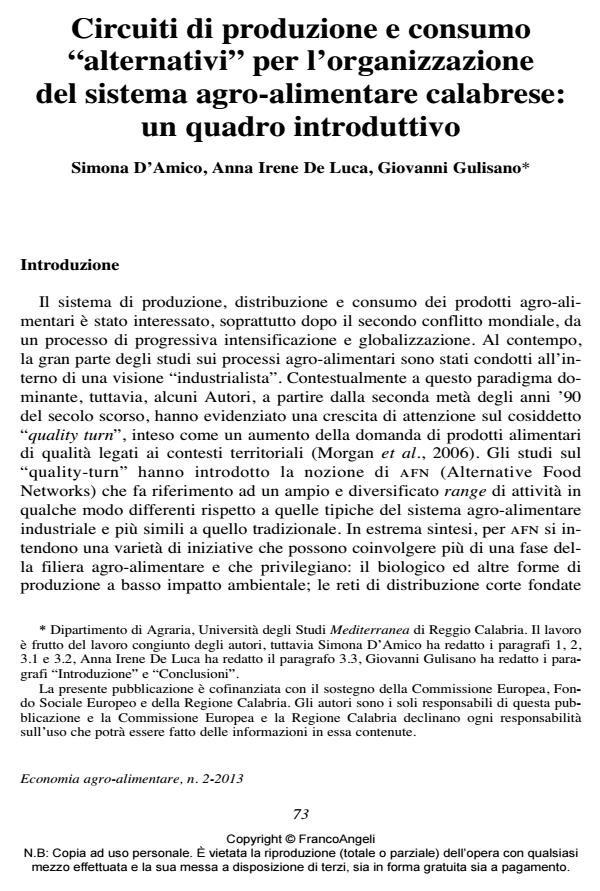Circuiti di produzione e consumo "alternativi" per l’organizzazione del sistema agro-alimentare calabrese: un quadro introduttivo
Titolo Rivista ECONOMIA AGRO-ALIMENTARE
Autori/Curatori Simona D'Amico, Anna Irene De Luca, Giovanni Gulisano
Anno di pubblicazione 2013 Fascicolo 2013/2
Lingua Italiano Numero pagine 24 P. 73-96 Dimensione file 142 KB
DOI 10.3280/ECAG2013-002005
Il DOI è il codice a barre della proprietà intellettuale: per saperne di più
clicca qui
Qui sotto puoi vedere in anteprima la prima pagina di questo articolo.
Se questo articolo ti interessa, lo puoi acquistare (e scaricare in formato pdf) seguendo le facili indicazioni per acquistare il download credit. Acquista Download Credits per scaricare questo Articolo in formato PDF

FrancoAngeli è membro della Publishers International Linking Association, Inc (PILA), associazione indipendente e non profit per facilitare (attraverso i servizi tecnologici implementati da CrossRef.org) l’accesso degli studiosi ai contenuti digitali nelle pubblicazioni professionali e scientifiche.
The work aims at formulating hypothesis on the actual alterity (Kirwan, 2004) ofthose realities that either define themselves or have been considered in the Calabriapolitical, social and scientific contexts as examples of "filiere corte", that is as foodpractices characterised by the afn (Alternative Food Networks) features, in the waythey have been defined by the international scientific literature. The study rises fromthe need to avoid the "conceptual conflation" (Tregear, 2011), which biased the fncomprehension at the international level and is finding a fertile land within theItalian scientific and empiric reality where scholars discuss the "filiere corte" initiativesin the frame of the afn studies although warning on the possibility ofoverlapping existing practices typical of an agri-food system that is not completelymodernised (Malassis & Ghersi, 1998; Rossi et al., 2008). Concerning this last pointCalabria doesn’t lag behind requiring an investigation on the actual nature andalterity of those realities framed among the "filiera corta" initiatives.Favouring a theoretical frame that allows considering the existing realities asdynamically interacting, rather than opposing each other, Convention Theory is thetheoretical starting point operationalized through the Granovetter (1985) concept of "emebeddedness": "filiere corte" are identified as one of the possible conventionsorganizing the Calabria agri-food system and shaping in the relation with the otheragri-food, political and social systems. After an empiric analysis, three generaltypologies have been identified among those either self-defined or recognised as"filiere corte": Farmer’s Market, GAS and GODO. Moreover three hypothesis ontheir technical, social and political "alterity" have been introduced: in the first case itcould derive from their ability to close the food chain, merging supply and demand;secondly it could be founded on their capacity to stimulate local form of socialcooperation; third they seem to require an innovative participatory approach in orderto be politically framed. Each of the three hypothesis are theoretically elaborated andrequire further empirical tests.
Parole chiave:Alternative Food Networks, Re-localization of agri-food, Embeddedness,South Italy
Jel codes:Q10, Q13, Z13
- Le filiere corte auto-organizzate dai consumatori: il modello dei Gruppi di Acquisto Solidale Emanuele Blasi, Clara Cicatiello, Silvio Franco, Barbara Pancino, in ECONOMIA AGRO-ALIMENTARE 2/2015 pp.33
DOI: 10.3280/ECAG2015-002003 - Toward an evaluation model for transnational cooperation activities in rural areas: a case study within an EU LEADER project Anna Irene De Luca, Nathalie Iofrida, Giovanni Gulisano, Alfio Strano, in Bulletin of Geography. Socio-economic Series /2018 pp.19
DOI: 10.2478/bog-2018-0029 - Sustainability Perception of Local Extra Virgin Olive Oil and Consumers’ Attitude: A New Italian Perspective Bianca Polenzani, Chiara Riganelli, Andrea Marchini, in Sustainability /2020 pp.920
DOI: 10.3390/su12030920
Simona D'Amico, Anna Irene De Luca, Giovanni Gulisano, Circuiti di produzione e consumo "alternativi" per l’organizzazione del sistema agro-alimentare calabrese: un quadro introduttivo in "ECONOMIA AGRO-ALIMENTARE" 2/2013, pp 73-96, DOI: 10.3280/ECAG2013-002005